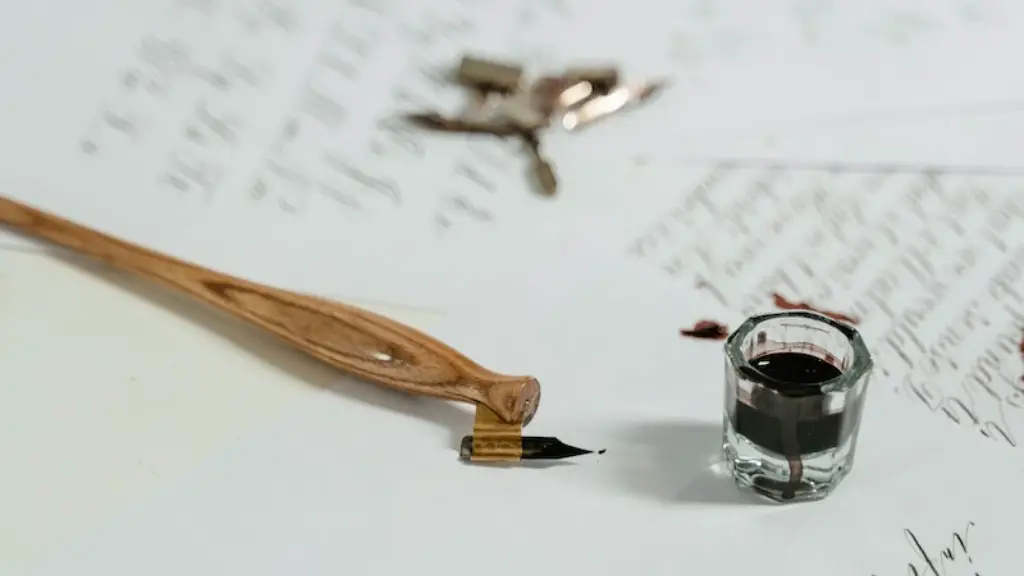Develop A Unique Voice
When developing poetry skills, one of the most important things to focus on is finding your unique voice. Writing any kind of poetry requires you to be in your own head and express emotions or ideas in a way that expresses your thoughts and feelings, as well as capturing an audience.
The way of finding your unique voice depends on the individual. While many poets are inspired by a great work or the masters of poetry who have come before them, it is important to remember that when you begin to develop your own poetry skills, you should focus on your own experience and ideas.
Take time to sit and just observe the world around you; the sights, sounds, smells, and feelings that you experience. By taking time to reflect on those experiences and turning them into words, you start to discover the unique voice you have been searching for.
Brainstorming Ideas
One of the most important parts of developing your poetry skills is taking time to brainstorm ideas first. While it is true that some of the most beautiful lines within a poem can be written on the spot, it is incredibly important to also come up with a concept for the poem first and outline what it is that you would like to express.
Perhaps take some time to free-write first, allowing the pen to flow freely and move to create a poem without any restrictions. You will eventually get to the point where you are ready to shape the poem into something more concrete, however it is important to express your thoughts and ideas freely first.
Read and Listen to Others
Developing your poetry skills also involves reading the works of other poets and poets you admire. Take time to really get to understand the lines and the way they are expressed – this will not only give you an idea of what poems should look and feel like, but it will also help you think more creatively when writing your own.
Take time to also read work that you don’t particularly like – this will help you appreciate good poetry even more. Pay attention to the language and the syntax used and take particular note of the rhythm and pacing of each poem.
It is also really important to listen to those around you – take time to sit and converse with others and really listen to the stories, ideas and experiences of others. This will help you understand different backgrounds and cultures and also help you to understand yourself better.
Look for Structure
When developing your own poetry skills, it is important to remember that structure is not just about the words themselves. Take time to think about where the line breaks should be placed, whether phrases should be italicised or bold or whether any particular words should stand out or be highlighted.
Think about the way that you build your poem from the first line to last. How do you want your readers to feel when they come to the end of your poem? Is there a particular story that you want to tell? Are you looking to evoke any particular emotions? All of these are important questions to think about when developing your poetry skills.
Rewrite and Edit
Once you have written a poem, it is important to take some time to reflect on it and decide whether it is the best way of expressing your thoughts and feelings. Take time to make notes and find ways in which to improve the poem – no poem is really ever finished so it is important to take time to look for ways to improve it.
It is also important to take some time to read the poem from someone else’s perspective. It may be useful to ask a friend or family member to do this for you, as it will help you to gain a better understanding of the poem from another person’s point of view and what works and what doesn’t.
The next step to developing your poetry skills is to share your poems with others. This means that you must be open to criticism and feedback from those who are willing to discuss your poem. This constructive feedback can be very helpful in honing your craft and will help you to become a better, more confident poet.
Post your work on websites, in magazines or even submit it to poets who have open calls for new work. This will not only help you become more confident in your own abilities, but it will also help you to make connections with other poets who can give you advice and guidance.
Express Yourself and Have Fun
Above all else, when developing your poetry skills it is important to remember to have fun with it.Your poem should be a way for you to express yourself and tell a story, so make sure that you don’t get too overwhelmed or stressed out.
Although of course, taking constructive criticism on board and being willing to rewrite or edit your poem is necessary, it is important to remember that if poetry isn’t enjoyable for you, it may be time to take a break and come back to it later.
Find Inspiration Everywhere
When you are looking to develop your poetry skills, it is important to remember to look for inspiration in all of the places, no matter where you are. Take time to observe and reflect and write down any individual lines or words that inspire you.
This can involve a conversation you overhear in the street, a beautiful landscape, or simply someone in your life who you admire and who you want to write about. Taking time to record these inspirations can help you to develop your own unique voice and help you to come up with new ideas for poems.
Try New Forms
Taking time to experiment with different forms of poetry is also key to developing your skills. Whether you decide to try writing a sonnet, a haiku or a free-form poem, it is important to remember to push yourself and to challenge yourself to try new things.
Each form has its own unique restrictions and rules, however this doesn’t mean that you have to be restricted in the way that you express yourself. Push yourself out of your comfort zone and approach each form with an open mind, allowing yourself to express yourself freely in the way that you choose.
Keep On Writing
Finally, to really develop your poetry skills, you must keep on writing. This means taking time to write new poems regularly and make sure that you are constantly pushing yourself and challenging yourself when writing.
It is also important to make sure that you take the time to reflect on your old poems and rewrite them where necessary. Taking time to reflect on the words that you have used and the way that you have expressed yourself will help you to develop your own unique style and create better and more refined poems.
Know When To Take A Break
It is also important to remember to take a break when necessary. Poetry can be incredibly demanding, both physically and mentally, so taking some time away from your work from time-to-time is important.
Taking a break doesn’t necessarily mean actively avoiding writing altogether – it can involve going out with friends and exploring the world, trying out a new hobby, or simply reading and listening to the work of others. Taking time away can help to replenish your mind and soul and help you to come back to writing with fresh ideas and perspectives.


